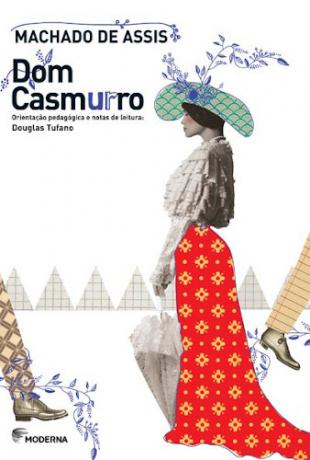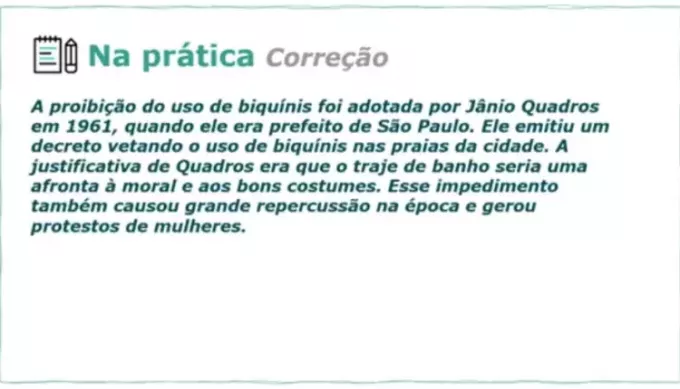A Brazilian literature it has been produced since the year 1500, when Pero Vaz de Caminha wrote his famous letter. Since then, several works have been written in the national territory and have characteristics of the following periods or literary styles: 16th century, Baroque, Arcadianism, Romanticism, Realism, Naturalism, Parnassianism, Symbolism, Pre-modernism, Modernism and contemporaneity.
Read too: Academia Brasileira de Letras — an important literary and cultural institution
Chronological division of Brazilian literature
→ Sixteenth century (1500-1601)
O whatuinhentism It was the literary period that encompassor the first texts written in Brazilian lands, in the sixteenth century. These texts have a theocentric perspective and were divided into two categories:
Information Literature: chronicles, cards and traveler reports.
Catechetical Literature:poems and theater plays aimed at catechizing the Brazilian indigenous peoples.
→ Baroque (1601-1768)
O Bbrazilian arroco began in 1601 and lasted until the second half of the 18th century. It was a
period style marked by duality and had these characteristics:anthropocentrism versus theocentrism;
material versus spiritual;
faith versus reason;
morbid appearance;
guilt;
reflection on the ephemerality of life;
tragic view of existence;
pessimism;
feism;
cultism;
conceptism;
carpe diem (enjoy the moment);
use of the new measure in the sonnets;
use of hyperbates, antitheses It is paradoxes;
poetry lyrical philosophical, sacred and satirical.
→ Arcadianism (1768-1836)
As reaction to feism baroque, came the period style Thercadism. O Thercadism in Brazil began in 1768 and was in evidence until 1836. Its main features were:
bucolism;
pastoralism;
idealization of love;
idealization of women;
appreciation of reason;
-
defense of the following ideas:
- flee urban (escape from the city);
- mediocre aurea (golden mediocrity);
- locus amoenus (nice place);
- useless truncat (cut the useless);
- carpe diem (enjoy the moment).
→ Romanticism (1836-1881)
O rBrazilian omantism began in 1836 and lasted until 1881, and it is possible to observe both poetry and romance It is theater.
► Poetry of Brazilian Romanticism
The poetry of Brazilian romanticism is divided into three phases.
-
First generation of Brazilian romanticism:
- Indianism;
- bucolism;
- nationalism;
- idealizations;
- religiosity.
-
Second generation of Brazilian romanticism:
- sentimental exaggeration;
- morbidity;
- amorous suffering;
- idealizations;
- pessimism.
-
Third generation of Brazilian romanticism:
- social criticism;
- more realistic view;
- valuation of emotion;
- heavy use of exclamations It is vocatives.
► Prose of Brazilian Romanticism
A prose of Brazilian romanticism is composed of three types.
-
Indianist:
- indigenous is the national hero;
- forest as a space for action;
- idealization of women and love;
- loving vassalage;
- reconstruction of the historical past;
- nationalistic character.
-
Urban:
- customs of the bourgeois elite;
- action space is the Rio de Janeiro;
- idealization of women and love;
- obstacles to loving fulfillment;
- melodramatic character;
- propensity for happy endings.
-
Regionalist:
- the rural environment is the narrative space;
- the country man is the rough and bold hero;
- idealization of women and love;
- obstacles to loving fulfillment;
- criticism of urban customs;
- patriarchy and female submission.
► Theater of Brazilian Romanticism
As for the romantic theater, it is possible to point out the following characteristics:
nationalistic aspect;
social and political criticism;
historical drama;
comic character.
→ Realism (1881-1902)
O realism in Brazil It was inaugurated in 1881 and has these characteristics:
objective language;
criticism of the bourgeois elite;
psychological analysis;
stream of consciousness;
sociopolitical issues;
absence of idealizations;
adultery theme;
irony.
→ Naturalism (1881-1902)
Naturalism in Brazil began in 1881. This period style has the following elements:
objective language;
determinism;
zoomorphization;
scientism;
absence of idealizations;
sociopolitical critique.
→ Parnassianism (1882-1893)
In 1882, the Brazilian parnassian poetry began to be published in the country. It presents the following characteristics:
objectivity;
descriptivism;
antiromanticism;
formal rigor;
social alienation;
Greco-Latin references.
It must be said that, in Brazil, Parnassian objectivity was not always strictly followed. This is because some poems from that period have subjective aspects, as they expose the emotion of the lyrical self. This is a Brazilian peculiarity.
→ Symbolism (1893-1902)
A Brazilian symbolist aesthetics came to be identified in the year 1893. Characterized by musicality and appreciation of sensations, the symbolism presents:
opposition to realistic literature;
subjectivity;
appreciation of spirituality;
defense of an ideal world;
probing of the self;
social alienation;
formal rigor;
power of suggestion;
allegorizing capital;
synesthesia.
→ Premodernism (1902-1922)
O Pre-modernism was a literary period beginning in 1902 and ending in 1922. It included, therefore, all the works published in those years. he did the transition from simbolism for the mBrazilian modernism.
Thus, it presented transition characteristics, that is, elements of past aesthetics (naturalism, Parnassianism and symbolism) coexisting with elements that would be present in modernism, such as critical nationalism and realism Social.
→ Modernism (1922-1978)
O mBrazilian modernism began in 1922, with the Modern Art Week.
► First phase of Brazilian modernism
A first phase of Brazilian modernism (1922 to 1930) had the following characteristics:
innovation;
nationalism;
anti-academicism;
antiromanticism;
free verses;
irony.
► Second phase of Brazilian modernism
the poetry of second level of Brazilian modernism (1930-1945) has the following characteristics:
contemporary theme;
sociopolitical criticism;
existential conflict;
mysticism;
regular, blank and free verses.
The prose of that period, the novel of the 1930s, presents:
regional character;
social realism;
determinism;
engaging storyline;
simple language.
► Third phase of Brazilian modernism
A third phase of Brazilian modernism (1945-1978), also known as Pos modernism, was composed of:
-
Generation of 1945:
- formal rigor;
- appreciation of the structure of the poem;
- sociopolitical theme.
-
Concrete poetry:
- experimental character;
- valorization of the space of the sheet of paper;
- verbivocovisual perspective.
-
Prose:
- experimental language;
- unconventional structure;
- fragmentation;
- metalanguage;
- stream of consciousness;
- universal theme.
Also access: Portuguese Literature — the literature that most influenced Brazilian literature throughout history
Characteristics of contemporary Brazilian literature

Contemporary Brazilian Literature includes books produced since 1970s to present day. Therefore, this category includes the well-known marginal poetry of the 1970s. Moreover, the main characteristic of contemporary literature is diversity:
intertextuality;
sociopolitical criticism;
social realism;
traces of past styles;
experimental character;
individualism;
lack of utopia;
humor;
eroticism;
valuing short stories and chronicles;
fragmentation;
urban violence;
fantastic realism;
intimate fiction;
creative freedom;
preoccupation with the structure of the poem.
Another important fact concerning contemporary literature is the strengthening of so-called peripheral literature or minority literature. Thus, works produced by peripheral authors and authors, for a minority audience (women, black men and women, LGBTQIA+ population, etc.), have greater visibility and attention than they had in the past.
Great authors of Brazilian literature
Pero Vaz de Caminha (1450-1500)
José de Anchieta (1534-1597)
Bento Teixeira (1561-1618)
Antonio Vieira (1608-1697)
Gregorio de Matos (1636-1696)
José de Santa Rita Durão (1722-1784)
Claudio Manuel da Costa (1729-1789)
Basílio da Gama (1741-1795)
Thomas Antonio Gonzaga (1744-1810)
Gonçalves de Magalhães (1811-1882)
Martin Pena (1815-1848)
Joaquim Manuel de Macedo (1820-1882)
Gonçalves Dias (1823-1864)
José de Alencar (1829-1877)
Álvares de Azevedo (1831-1852)
Manuel Antonio de Almeida (1831-1861)
Sousândrade (1833-1902)
Casimiro de Abreu (1839-1860)
Machado de Assis (1839-1908)
Fagundes Varela (1841-1875)
Franklin Távora (1842-1888)
Viscount of Taunay (1843-1899)
Castro Alves (1847-1871)
Teófilo Dias (1854-1889)
Aluísio Azevedo (1857-1913)
Alberto de Oliveira (1857-1937)
Raimundo Correia (1859-1911)
Cruz e Sousa (1861-1898)
Julia Lopes de Almeida (1862-1934)
Raul Pompeia (1863-1895)
Olavo Bilac (1865-1918)
Euclides da Cunha (1866-1909)
Adolfo Caminha (1867-1897)
Graça Aranha (1868-1931)
Alphonsus de Guimaraes (1870-1921)
Francisca Julia (1871-1920)
Lima Barreto (1881-1922)
Monteiro Lobato (1882-1948)
Augusto dos Anjos (1884-1914)
Manuel Bandeira (1886-1968)
Cora Coralina (1889-1985)
Oswald de Andrade (1890-1954)
Graciliano Ramos (1892-1953)
Mario de Andrade (1893-1945)
Jorge de Lima (1893-1953)
Cecilia Meireles (1901-1964)
Murilo Mendes (1901-1975)
Carlos Drummond de Andrade (1902-1987)
Erico Verissimo (1905-1975)
Mario Quintana (1906-1994)
Joao Guimarães Rosa (1908-1967)
Rachel de Queiroz (1910-2003)
Jorge Amado (1912-2001)
Vinicius de Moraes (1913-1980)
Caroline Mary of Jesus (1914-1977)
Jose J. Veiga (1915-1999)
Murilo Rubião (1916-1991)
Manoel de Barros (1916-2014)
Clarice Lispector (1920-1977)
Joao Cabral de Melo Neto (1920-1999)
Fernando Sabino (1923-2004)
Lygia Fagundes Telles (1923-2022)
Rubem Fonseca (1925-2020)
Décio Pignatari (1927-2012)
Haroldo de Campos (1929-2003)
Hilda Hilst (1930-2004)
Ferreira Gullar (1930-2016)
Augusto de Campos (1931-)
Cassandra Rios (1932-2002)
Adelia Prado (1935-)
Cacaso (1944-1987)
Paulo Leminski (1944-1989)
Conceição Evaristo (1946-)
Caio Fernando Abreu (1948-1996)
Ana Cristina Cesar (1952-1983)
Milton Hatoum (1952-)
Marcelo Rubens Paiva (1959-)
Bernardo Carvalho (1960-)
Main works of Brazilian literature

The letter (1500), by Pero Vaz de Caminha
poem to the virgin (1563), by José de Anchieta
Prosopopoeia (1601), by Bento Teixeira
sermons (1679), by Antonio Vieira
Poetic works of Glauceste Saturnius (1768), by Claudio Manuel da Costa
the uruguay (1769), by Basílio da Gama
Caramuru (1781), by José de Santa Rita Durão
Marília de Dirceu (1792), by Tomás Antônio Gonzaga
Poetic sighs and longing (1836), by Gonçalves de Magalhães
the brunette (1844), by Joaquim Manuel de Macedo
chilean letters (1845), by Tomás Antônio Gonzaga
the novice (1853), by Martins Pena
twenty years lyre (1853), by Álvares de Azevedo
Memoirs of a militia sergeant (1854), by Manuel Antônio de Almeida
the timbiras (1857), by Gonçalves Dias
the springs (1859), by Casimiro de Abreu
Voices of America (1864), by Fagundes Varela
Iracema(1865), by José de Alencar
the slave ship(1868), by Castro Alves
Innocence (1872), by Viscount of Taunay
the hair (1876), by Franklin Tavora
The Posthumous Memoirs of Bras Cubas (1881), by Machado de Assis
fanfares (1882), by Teófilo Dias
symphonies (1883), by Raimundo Correia
wandering quesa (1884), by Sousândrade
Southern (1884), by Alberto de Oliveira
The Athenaeum (1888), by Raul Pompeia
poems (1888), by Olavo Bilac
the tenement (1890), by Aluísio Azevedo
bucklers (1893), by Cruz e Sousa
Bom-Crioulo (1895), by Adolfo Caminha
marbles (1895), by Francisca Júlia
burning chamber (1899), by Alphonsus de Guimaraens
Dom Casmurro(1899), by Machado de Assis
bankruptcy (1901), by Júlia Lopes de Almeida
the sertões(1902), by Euclides da Cunha
Canaan (1902), by Graça Aranha
I (1912), by Augusto dos Anjos
Sad end of Policarpo Quaresma (1915), by Lima Barreto
Urupese (1918), directed by Monteiro Lobato
Works by Gregorio de Matos (1923-1933), by Gregório de Matos
Sentimental memories of João Miramar (1924), by Oswald de Andrade
Macunaíma (1928), by Mario de Andrade
the fifteen (1930), directed by Rachel de Queiroz
debauchery (1930), by Manuel Bandeira
Form and exegesis (1935), by Vinicius de Moraes
Dried lives (1938), by Graciliano Ramos
the visionary (1941), directed by Murilo Mendes
The People's Rose (1945), by Carlos Drummond de Andrade
black poems (1947), by Jorge de Lima
the lust of sin (1948), by Cassandra Rios
The time and the wind (1949-1962), by Erico Verissimo
Romanceiro da Inconfidência (1953), by Cecília Meireles
Death and Severe Life (1955), directed by João Cabral de Melo Neto
Great hinterland: paths (1956), directed by João Guimarães Rosa
the appointment (1956), directed by Fernando Sabino
Eviction room: diary of a slum dweller (1960), by Carolina Maria de Jesus
Poems from the alleys of Goiás and more stories (1965) by Cora Coralina
The time of the ruminants (1966), by Jose J. Veiga
The girls (1973), by Lygia Fagundes Telles
The pyrotechnician Zacarias (1974), directed by Murilo Rubião
dirty poem (1976), directed by Ferreira Gullar
Baggage (1976), by Adelia Prado.
Supernatural History Notes (1976), directed by Mario Quintana
poetry because it is poetry (1977), directed by Décio Pignatari
the star hour (1977), directed by Clarice Lispector
on the tightrope (1978), by Cacaso
long live boo (1979), by Augusto de Campos
The obscene lady D (1982) by Hilda Hilst
moldy strawberries (1982), directed by Caio Fernando Abreu
at your feet (1982), directed by Ana Cristina Cesar
happy old year (1982), directed by Marcelo Rubens Paiva
galaxies (1984), by Haroldo de Campos
distracted we will win (1987), by Paulo Leminski
Vast emotions and imperfect thoughts (1988), by Rubem Fonseca
Report of a certain East (1989), directed by Milton Hatoum
The Book of Ignorance (1993), by Manoel de Barros
nine nights (2002), by Bernardo Carvalho
Poncia Vicencio (2003), by Conceição Evaristo
image credit
[1] Modern Publisher (reproduction)
By Warley Souza
Literature Teacher
Source: Brazil School - https://brasilescola.uol.com.br/literatura/literatura-brasileira.htm

